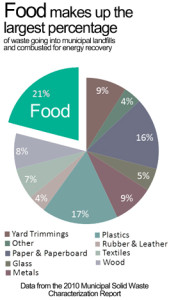Jun 17
2013
Buffalo misses big savings with food compost

Some critics of New York City Mayor Michael Bloomberg say he hasn’t done enough to boost his city’s recycling rate.
Similar criticism has been aimed at Buffalo Mayor Byron Brown, whose administration has seen some modest success with the green totes rolled out in December 2011 and a recycling coordinator hired last month after a four year vacancy.
Neither city has been able to reach the national average rate for recycling of 34 percent. Buffalo’s curbside recycling rate for 2012 was 12.2 percent; New York City’s rate is about 15 percent.
Bloomberg isn’t settling for below average.
He started a pilot food composting program and all indications are that city residents love it. Residents store the food scraps in a small container that, when full, gets dumped into a larger brown bin for curbside pickup, according to the New York Times article. There are central dumping locations for apartment buildings.
Now Bloomberg wants to hire a composting plant that can handle 100,000 tons of food scraps a year, about 10 percent of the city’s food waste. The city may also within a year seek proposals for a firm to build a facility that can process the food waste into bio-gas.
By 2016, the city could have a voluntary composting program for residents, with the possibility of it becoming mandatory years later.
Buffalo does not have such a program, but there are some nonprofit agencies that do it on their own.
The Community Action Organization of Erie County recently obtained a Department of Environmental Conservation permit that allows agency officials to collect 1,000 cubic yards of food scraps, which is more than 1,000 tons. The compost would be used to fertilize gardens on site and sold as composted soil.
Mike Lee, the agency’s master gardener, said the CAO collects about 300 tons of food scraps each year from a handful of restaurants.
“We do the entire campus of Buff State now,” Lee said.
Farmer Pirates Cooperative also has a local composting program for $100 a year and the Massachusetts Avenue Project does pick up some food scraps from local businesses.
Bloomberg realizes the savings — the city pays $80 a ton in tipping fees to landfill the food scraps.
But these realizations haven’t hit Buffalo yet. There’s a lot of money thrown away here.
Buffalo residents discarded roughly 115,000 tons of garbage last year, at about $55 a ton in tipping fees. Most of the waste that is dumped at landfills is food scraps, according to the Environmental Protection Agency.
This means Buffalo could save about $1.4 million a year if it had a residential composting program, and that’s a conservative estimate.
Would a residential composting program work in Buffalo similar to what Bloomberg is trying?
Let’s hear from you.

